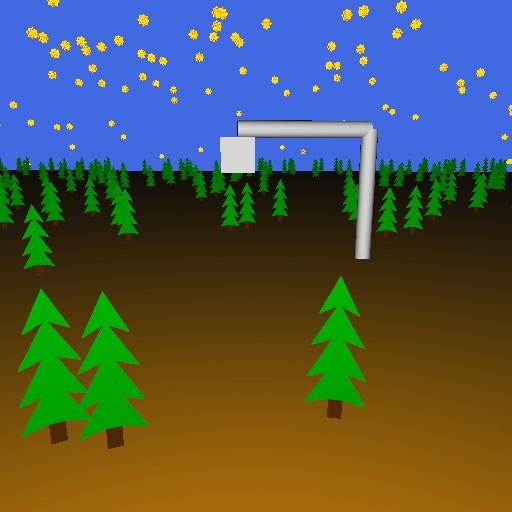This tutorial demonstrates how to use the vl::Billboard class to orient objects towards the camera.

The term "billboard" in computer graphics refers to an object that always faces the camera. Visualization Library supports two kinds of billboards, "spherical billboards" and "axis aligned billboards". The first kind is free to rotate in any direction and always faces the camera perfectly. The second kind rotates towards the camera but only around a specific rotation axis. This last kind is often used to create billboard trees which should face the camera but whose rotational axis must remain parallel to the world Y axis.
The following tutorial implements a simple forest using axis aligned billboards. To make the scene more interesting we will also add stars on the sky using spherical billboards. At the center of the scene we will also put a cube whose transform is a billboard attached to an animated transform tree. This demonstrates how billboards behave when attached to animated transform trees. When running the demo note how the cube keeps facing the camera while following its transform's parent's rotation.
[From App_Billboards.cpp]
class App_Billboards: public BaseDemo { public: // initialization void initEvent() { vl::Log::notify(appletInfo()); srand((unsigned int)time(NULL)); generateTrees (100.0f, 500); generateStars (100.0f, 500); generateGround(100.0f); generateLunapark(); } void generateTrees(float side, int tree_count) { // simple effect to render a tree billboard vl::ref<vl::Effect> effect = new vl::Effect; // speedup tip: this allows VL to batch all the trees together greatly speeding up the rendering and avoiding switching textures back and forth with the stars. effect->setRenderRank(2); effect->shader()->setRenderState( new vl::Light, 0 ); effect->shader()->enable(vl::EN_BLEND); effect->shader()->enable(vl::EN_DEPTH_TEST); effect->shader()->gocDepthMask()->set(false); effect->shader()->enable(vl::EN_LIGHTING); effect->shader()->gocLight(0)->setLinearAttenuation(0.025f); effect->shader()->gocTextureSampler(0)->setTexture( new vl::Texture("images/tree.png") ); vl::ref<vl::Geometry> tree = generateQuad(); tree->transform( vl::mat4::getTranslation(0,+0.5f,0) ); tree->transform( vl::mat4::getScaling(1.0f,+2.0f,1.0f) ); tree->computeNormals(); for(int i=0; i<tree_count; i++) { // new billboard vl::ref<vl::Billboard> billboard = new vl::Billboard; // set axis-aligned billboard type: rotate the billboard towards the camera but only around the specified axis. billboard->setType(vl::BT_AxisAlignedBillboard); billboard->setAxis(vl::vec3(0,1.0f,0)); // bind billboard to the transform tree rendering()->as<vl::Rendering>()->transform()->addChild(billboard.get()); // generate a random position vl::real x = vl::random(-side/2.0f,+side/2.0f); vl::real y = 0; vl::real z = vl::random(-side/2.0f,+side/2.0f); billboard->setPosition( vl::vec3(x,y,z) ); // add the tree actor sceneManager()->tree()->addActor(tree.get(), effect.get(), billboard.get()); } } void generateStars(float side, int star_count) { // simple effect to render a star billboard vl::ref<vl::Effect> effect = new vl::Effect; // speedup tip: this allows VL to batch all the stars together greatly speeding up the rendering and avoiding switching textures back and forth with the trees. effect->setRenderRank(1); effect->shader()->enable(vl::EN_BLEND); effect->shader()->enable(vl::EN_DEPTH_TEST); effect->shader()->gocTextureSampler(0)->setTexture( new vl::Texture("images/sun.png", vl::TF_RGBA, true) ); vl::ref<vl::Geometry> star = generateQuad(); for(int i=0; i<star_count; i++) { // new billboard vl::ref<vl::Billboard> billboard = new vl::Billboard; // set spherical billboard type: orient the object always towards the camera. billboard->setType(vl::BT_SphericalBillboard); // add billboard to the transform tree rendering()->as<vl::Rendering>()->transform()->addChild(billboard.get()); // compute a random point on the skydome vl::real x = vl::random(-1.0f,+1.0f); vl::real y = vl::random(0,2.0f); vl::real z = vl::random(-1.0f,+1.0f); vl::vec3 n(x,y,z); n.normalize(); n = n * sqrt(side*side/2.0f); n.y() *= 0.2f; // set the billboard position and rotation center. billboard->setPosition( n ); // add the star actor sceneManager()->tree()->addActor(star.get(), effect.get(), billboard.get()); } } // generates the ground void generateGround(float side) { // orange effect using lighting vl::ref<vl::Effect> effect = new vl::Effect; effect->shader()->setRenderState( new vl::Light, 0 ); effect->shader()->enable(vl::EN_LIGHTING); effect->shader()->gocLight(0)->setLinearAttenuation(0.025f); effect->shader()->gocMaterial()->setDiffuse(vl::orange); effect->shader()->enable(vl::EN_DEPTH_TEST); // use a simple plane to render the ground vl::ref<vl::Geometry> geom = vl::makeGrid(vl::vec3(0,0,0), side, side, 200, 200); geom->computeNormals(); sceneManager()->tree()->addActor( geom.get(), effect.get(), NULL); } // returns a Geometry that renders a single quad vl::ref<vl::Geometry> generateQuad() { // geometry vl::ref<vl::Geometry> quad = new vl::Geometry; // quad vertices vl::ref<vl::ArrayFloat3> vert = new vl::ArrayFloat3; vert->resize( 4 ); quad->setVertexArray(vert.get()); vert->at(0) = vl::fvec3( -0.5f, -0.5f, 0.0f ); vert->at(1) = vl::fvec3( +0.5f, -0.5f, 0.0f ); vert->at(2) = vl::fvec3( +0.5f, +0.5f, 0.0f ); vert->at(3) = vl::fvec3( -0.5f, +0.5f, 0.0f ); // texture coords vl::ref<vl::ArrayFloat2> texc = new vl::ArrayFloat2; texc->resize( 4 ); quad->setTexCoordArray(0,texc.get()); texc->at(0) = vl::fvec2( 0.0f, 0.0f ); texc->at(1) = vl::fvec2( 1.0f, 0.0f ); texc->at(2) = vl::fvec2( 1.0f, 1.0f ); texc->at(3) = vl::fvec2( 0.0f, 1.0f ); // quad primitive quad->drawCalls()->push_back( new vl::DrawArrays(vl::PT_TRIANGLE_FAN, 0, 4) ); return quad; } // This function demonstrates how a billboard behaves when it is put under an animated transform hierarchy. // Note how the cube always faces the camera even if it follows its parent's rotation. void generateLunapark() { vl::ref<vl::Effect> effect = new vl::Effect; effect->shader()->setRenderState( new vl::Light, 0 ); effect->shader()->enable(vl::EN_BLEND); effect->shader()->enable(vl::EN_DEPTH_TEST); effect->shader()->enable(vl::EN_LIGHTING); vl::ref<vl::Geometry> arm_g = vl::makeCylinder(vl::vec3(0,0,0), 0.5f, 4.0f); arm_g->computeNormals(); vl::ref<vl::Transform> arm1_t = new vl::Transform; vl::ref<vl::Transform> arm2_t = new vl::Transform; rendering()->as<vl::Rendering>()->transform()->addChild(arm1_t.get()); arm1_t->addChild(arm2_t.get()); arm2_t->setLocalMatrix(vl::mat4::getTranslation(0.0f,2.0f,0.0f) * vl::mat4::getRotation(90,0,0,1) * vl::mat4::getTranslation(0.0f,2.0f,0.0f)); sceneManager()->tree()->addActor( arm_g.get(), effect.get(), arm1_t.get()); sceneManager()->tree()->addActor( arm_g.get(), effect.get(), arm2_t.get()); vl::ref<vl::Geometry> box = vl::makeBox(vl::vec3(0,-0.75f,0), 1, 1, 1); box->computeNormals(); // the billboard vl::ref<vl::Billboard> billboard = new vl::Billboard; // use an axis aligned billboard billboard->setType(vl::BT_AxisAlignedBillboard); // the axis is always in world coordinates billboard->setAxis(vl::vec3(0,1,0)); // remember that "position" is relative to the billboard's parent's coordinates billboard->setPosition(0,2,0); // add the billboard to its transform parent arm2_t->addChild(billboard.get()); // add the box actor sceneManager()->tree()->addActor( box.get(), effect.get(), billboard.get()); // to be animated below mArm1Transform = arm1_t; } // animate the lunapark void updateScene() { mArm1Transform->setLocalMatrix( vl::mat4::getRotation(vl::Time::currentTime()*45,0,1,0) * vl::mat4::getTranslation(0.0f,2.0f,0.0f) ); } protected: vl::ref<vl::Transform> mArm1Transform; }; // Have fun!